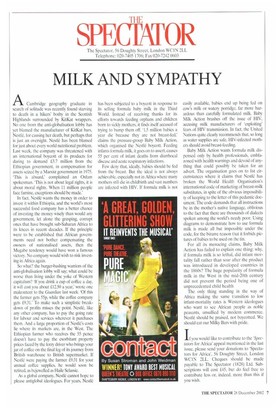MILK AND SYMPATHY
ACambridge geography graduate in search of solitude was recently found starving to death in a hikers' bothy in the Scottish Highlands surrounded by KitKat wrappers. No one from the anti-globalisation lobby has yet blamed the manufacturer of KitKat bars. Nestle, for causing her death, but perhaps that is just an oversight. Nestle has been blamed for just about every world nutritional problem. Last week, the company was threatened with an international boycott of its products for daring to demand 0.7 million from the Ethiopian government, in compensation for assets seized by a Marxist government in 1975. 'This is absurd.' complained an Oxfam spokesman. 'This is not about legal rights, it is about moral rights. When 11 million people face famine, exceptions should be made.'
In fact. Nestle wants the money in order to invest it within Ethiopia, and the world's most successful food company has a better chance of investing the money wisely than would any government, let alone the grasping, corrupt ones that have brought sub-Saharan Africa to its knees in recent decades. If the principle were to be established that African governments need not bother compensating the owners of nationalised assets, then the Mugabe tendency would have won a famous victory. No company would wish to risk investing in Africa again.
So what? the burger-bashing warriors of the anti-globalisation lobby will say; what could be worse than living under the yoke of Western capitalism? 'If you drink a cup of coffee a day, it will cost you about £12.50 a year,' wrote one malcontent to the Guardian last week. 'Of this the farmer gets 55p, while the coffee company gets £9.31.' To make such a simplistic breakdown of profits misses the point. Nestle', like any other company, has to pay the going rate for labour and seivices wherever it purchases them. And a large proportion of Nestle's costs lie where its markets are, in the West. The Ethiopian farmer who receives the 55 pence doesn't have to pay the exorbitant property prices faced by the lony driver who brings your jar of coffee on the final leg of its journey from British warehouse to British supermarket. If Nestle were paying the farmer £9.31 for your annual coffee supplies, he would soon be retired, as bejewelled as Haile Selassie.
As a global company, Nestle cannot hope to please antiglobal ideologues. For years, Nestle has been subjected to a boycott in response to its selling formula baby milk in the Third World. Instead of receiving thanks for its efforts towards feeding orphans and children born to sickly mothers, it finds itself accused of trying to bump them off. '1.5 million babies a year die because they are not breast-fed,' claims the pressure-group Baby Milk Action, which organised the Nestle boycott. Feeding infants formula milk, it goes on to assert, causes 55 per cent of infant deaths from diarrhoeal disease and acute respiratory infections.
Few deny that, ideally, babies should be fed from the breast. But the ideal is not always achievable, especially not in Africa where many mothers still die in childbirth and vast numbers are infected with HIV. If formula milk is not easily available, babies end up being fed on cow's milk or watery porridge, far more hazardous than carefully formulated milk. Baby Milk Action brushes off the issue of HIV, accusing milk manufacturers of 'exploiting' fears of HIV transmission. In fact, the United Nations quite clearly recommends that, so long as water supplies are safe, HIV-infected mothers should avoid breast-feeding.
Baby Milk Action wants formula milk dispensed only by health professionals, embla zoned with health warnings and devoid of any thing that could possibly be taken for an advert. The organisation goes on to list cir cumstances where it claims that Nestle has broken the World Health Organisation's international code of marketing of breast-milk substitutes, in spite of the obvious impossibili ty' of keeping to the letter of this pedantic document. The code demands that all instructions be in the mother's native language, oblivious to the fact that there are thousands of dialects spoken among the world's needy poor. Using diagrams to demonstrate how to use formula milk is made all but impossible under the code, for the bizarre reason that it forbids pictures of babies to be used on the tin.
For all its menacing claims, Baby Milk Action has failed to explain one thing: why, if formula milk is so lethal, did infant mor tality fall rather than soar after the product was introduced in developed countries in the 1860s? The huge popularity of formula milk in the West in the mid-20th century did not prevent the period being one of unprecedented child health.
The only thing standing in the way of Africa making the same transition to low infant-mortality rates is Western ideologues who want to see African people as noble peasants, unsullied by modern commerce. Nestle should be praised, not boycotted. We should eat our Milky Bars with pride.
If you would like to contribute to the 'Spectators for Africa' appeal mentioned in the last issue, please send your donations to 'Spectators for Africa', 56 Doughty Street, London WC1N 2LL. Cheques should be made payable to The Spectator 0828) Ltd. Subscriptions will cost £45, but do feel free to contribute less or, indeed, more than this if you wish.


























































 Previous page
Previous page